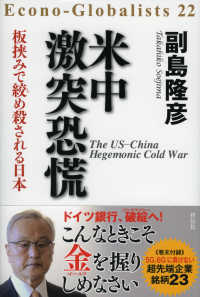基本説明
Whereas Volume II sought to comprehensively review the proliferating theories and models of instruction of the 1980’s and 1990’s, Volume III takes on an even more daunting task: starting to build a common knowledge base that underlies and supports the vast array of instructional theories, models and strategies that constitute the field of Instructional Design.
Full Description
Instructional-Design Theories and Models, Volume III: Building a Common Knowledge Base is perhaps best described by its new subtitle. Whereas Volume II sought to comprehensively review the proliferating theories and models of instruction of the 1980's and 1990's, Volume III takes on an even more daunting task: starting to build a common knowledge base that underlies and supports the vast array of instructional theories, models and strategies that constitute the field of Instructional Design. Unit I describes the need for a common knowledge base, offers some universal principles of instruction, and addresses the need for variation and detailed guidance when implementing the universal principles. Unit II describes how the universal principles apply to some major approaches to instruction such as direct instruction or problem-based instruction. Unit III describes how to apply the universal principles to some major types of learning such as understandings and skills. Unit IV provides a deeper understanding of instructional theory using the structural layers of a house as its metaphor and discusses instructional theory in the broader context of paradigm change in education.
Contents
UNIT 1: FRAMEWORKS FOR UNDERSTANDING INSTRUCTIONAL THEORY
1. Understanding Instructional Theory, Charles M. Reigeluth & Alison Carr-Chellman
2. Understanding Instruction, Charles M. Reigeluth & John B. Keller
3. First Principles of Instruction, M. David Merrill
4. Situational Principles of Instruction, Charles M. Reigeluth & Alison Carr-Chellman
UNIT 2: THEORIES FOR DIFFERENT APPROACHES TO INSTRUCTION
5. Direct Approach to Instruction, William G. Huitt, David M. Monetti, & John H. Hummel
6. Discussion Approach to Instruction, Joyce Taylor Gibson
7. Experiential Approach to Instruction, Lee Lindsey & Nancy Berger
8. Problem-Based Approach to Instruction, John R. Savery
9. Simulation Approach to Instruction, Andrew S. Gibbons, Mark McConkie, Kay Kyeongju Seo, & David Wiley
UNIT 3: Theories for Different Outcomes of Instruction
10. Fostering Skill Development Outcomes, Alexander Romiszowski
11. Fostering Understanding Outcomes, Martha Stone Wiske & Brian J. Beatty
12. Fostering Affective Development Outcomes: Emotional Intelligence, Barbara Bichelmeyer, James Marken, Tamara Harris, Melanie Misanchuk, & Emily Hixon
13. Fostering Integrated Learning Outcomes across Domains, Brian J. Beatty
UNIT 4: TOOLS FOR BUILDING A COMMON KNOWLEDGE BASE
14. The Architecture of Instructional Theory, Andrew S. Gibbons & P. Clint Rogers
15. Domain Theory for Instruction: Mapping Attainments to Enable Learner-Centered Education, C. Victor Bunderson, David A. Wiley, & Reo McBride
16. Learning Objects and Instructional Theory, David A. Wiley
17. Theory Building, Charles M. Reigeluth & Yun-Jo An
18. Instructional Theory for Education in the Information Age, Charles M. Reigeluth
Author Index
Subject Index







